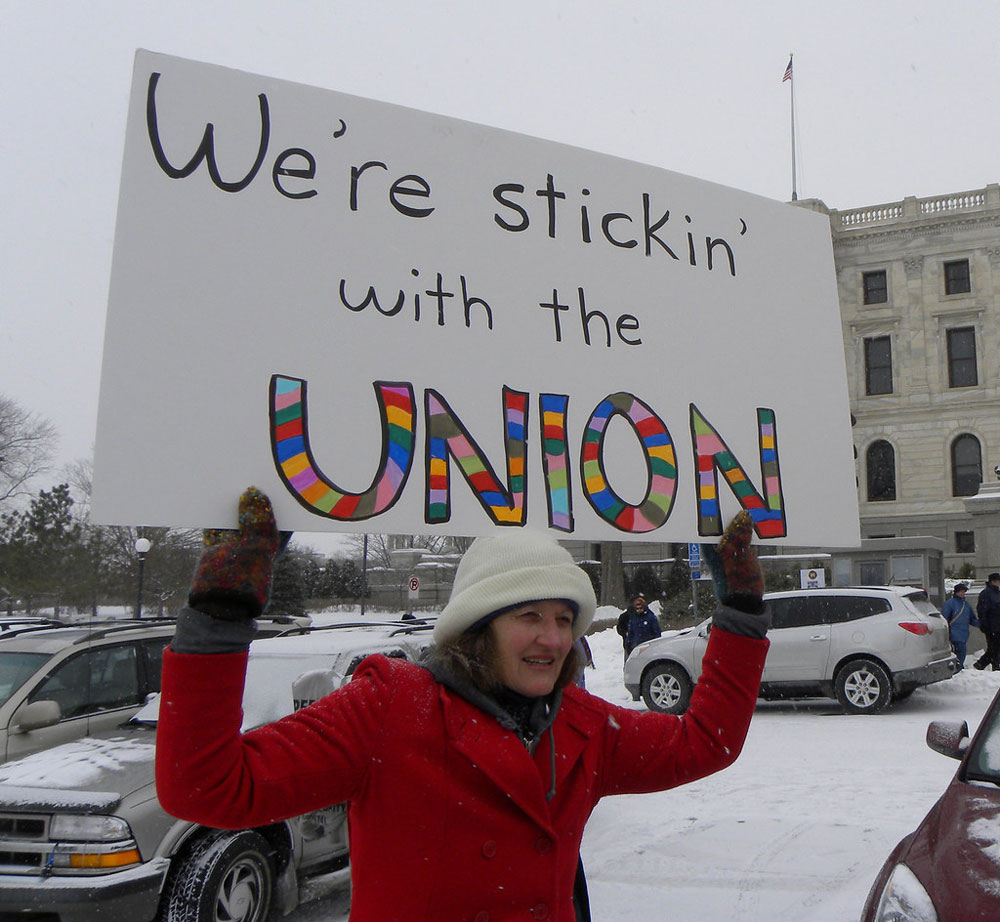
August 15, 2019; In These Times
Are you stressed at work? Is life in your role as a worker at a nonprofit getting overwhelming? Do you feel the pressure of trying to help others all day? Then it is time to tend to yourself.
At least that’s what the self-help industry would like you to think. One website offers 275 ideas to help you cope with stress, claiming that before you can help others, you need to help yourself—kind of like in an airplane, when the pressure drops and you are supposed to put your own mask on before helping the person next to you.
Not so fast, says Kayla Blado, president of the Nonprofit Professional Employees Union (NPEU). She believes the best solution to burnout among workers at nonprofit organizations is not self-help, but to unionize. Come together with your fellow workers and colleagues and negotiate organization-wide agreements that help everyone.
Establishing positive workplace conditions and reasonable pay might actually benefit the nonprofit, when you think about it, since it means the organization is literally putting its money where its mouth is when it comes to fair treatment of its workers.
NPEU’s motto is, “Bringing nonprofit professionals together to ensure great nonprofits thrive.” Currently, there are 14 organizations listed as where the union “works,” many of which have a mission to promote workers’ rights. The union is run by volunteers, including an executive committee made up of worker representatives at organizations that have signed on. Blado herself, for example, works at Economic Policy Institute.
Sign up for our free newsletters
Subscribe to NPQ's newsletters to have our top stories delivered directly to your inbox.
By signing up, you agree to our privacy policy and terms of use, and to receive messages from NPQ and our partners.
We would be remiss if we did not ask how EPI, which actively promotes the Fight for $15 among government workers, would view an organization that promotes workers’ rights but relies on unpaid labor.
Blado points out that some nonprofits have joined with other unions, including the Brooklyn Academy of Music, which affiliated with the United Auto Workers, and ALIGN New York, whose workers affiliated with the Communication Workers of America.
Union strength has been declining for many years. Often, unions have been branded as adversarial to employers and, therefore, the people they hire. Blado and NPEU specifically work to counter this impression in their materials. Their goal, they say, is to support nonprofits and the good work they do. In her opinion piece, Blado argues that nonprofit workers feel stressed because of low pay, irregular and long hours, and lack of upward mobility. By coming together and finding a “voice on the job,” workers can advocate for changes that improve morale. In so doing, the work of the nonprofit can be done by people who are not burnt out—and that, NPEU contends, is good for the nonprofit, its employees, and the community being served.
The benefits of workers in a nonprofit organization coming together were discussed several years ago in an NPQ piece by Rick Cohen. NPQ has also been covering worker co-ops as an alternative workplace structure. Steve Dubb, for example, explored whether or not worker ownership could take center stage in the 2020 election. The point is that any nonprofit scared to deal with a union must overcome that fear. Do they perhaps feel guilty for exploiting workers while supposedly working to improve a community’s quality?
In fact, cooperation with and among workers is known to have significant benefits. One example cited on the NPEU website is a recently ratified two-year contract with the Center for Economic and Policy Research. Elements of the contract include a base minimum salary ($47,746), unlimited sick time, child-care and paid leave allowances, incorporating gender neutral language, and anti-harassment and anti-bullying language.
So, yes, if you are feeling stressed, go find some “me time” and invest in yourself. But, as Blado argues, no amount of essential oils or lunchtime walks will help with your long hours, low pay, and work-related frustrations. What might help is coming together with your colleagues as “us” and finding your collective voice.—Rob Meiksins













